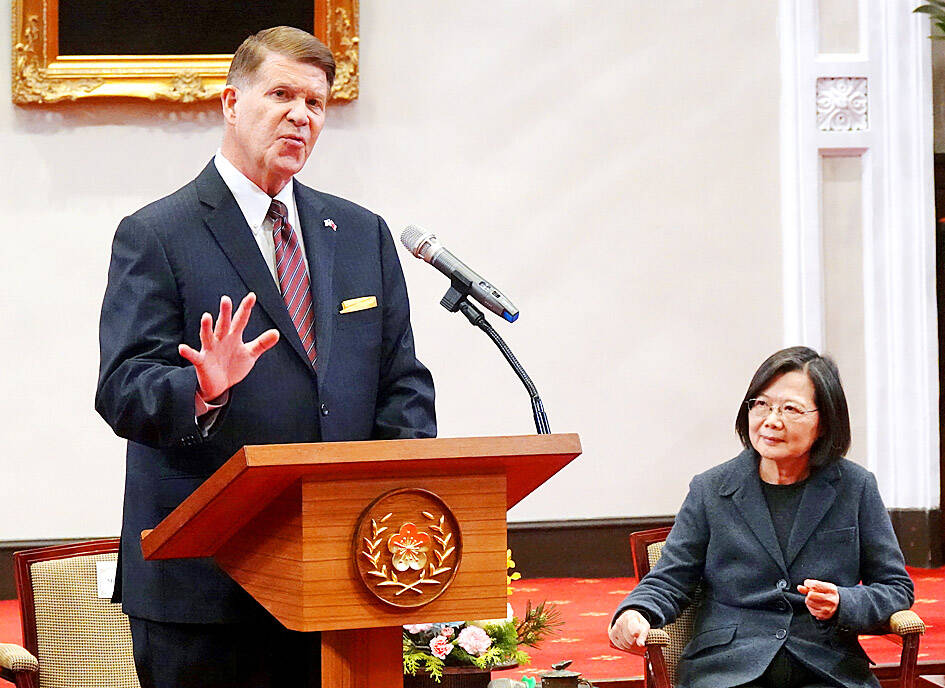Taiwan is working closely with the US to resolve the issue of double taxation in the hope of deepening bilateral partnerships in key supply chains, President Tsai Ing-wen (蔡英文) told a US-Taiwan Business Council delegation yesterday.
Led by former US undersecretary of state for economic growth, energy and the environment Keith Krach, the delegation consists of representatives from 29 US companies in fields such as energy, finance, defense and advanced technology.
Tsai thanked Krach for his efforts to promote cooperation and exchanges between Taiwan and the US, as well as the businesses for attaching great importance to the Taiwan market.

Photo: CNA
Taiwan has demonstrated resilience in the past few years amid an uncertain global economic environment due to the COVID-19 pandemic and the geopolitical landscape, maintaining its international competitiveness and contributing to the stability of the global supply chain, she said.
As the eighth-largest trading partner of the US, Taiwan is seeking solutions to the double taxation issue to build a better investment environment for both sides and deepen partnerships in key supply chains, she said.
The US House of Representatives Committee on Ways and Means on Friday approved the Tax Relief for American Families and Workers Act of 2024, which includes removing the current double taxation between the US and Taiwan, which Tsai said is welcome progress.
She also expressed Taiwan’s willingness to join the Washington-led Indo-Pacific Economic Framework, while soliciting support from the council.
Krach congratulated president-elect William Lai (賴清德) and vice president-elect Hsiao Bi-khim (蕭美琴) and praised Taiwanese as they “stood resolutely behind their democracy and sent a clear message to the rest of the world that their freedom is here to stay” through the presidential and legislative elections on Jan. 13.
The results of the elections also indicated public support for Taiwan to maintain its ties with the US, he said.
“The momentum between the US and Taiwan will keep growing and our friendship will soar to new heights,” he added.
The delegation is to discuss topics of mutual interest with Taiwanese counterparts, including trade policies, investment opportunities and technological cooperation with the goal of driving economic growth and innovation for both the US and Taiwan, he said.
Now chairman of the Krach Institute for Tech Diplomacy at Purdue, Krach said that the institute launched the Taiwan Center for Innovation and Prosperity to partner with Taiwan’s leading companies and innovators to “provide access to world-class talent, a rich investment ecosystem and raise Taiwan’s international standing.”
There is bipartisan consensus in Washington that Taiwan’s freedom and prosperity are “in the economic, technological, scientific and national security interests of the US and the free world,” he said.
On Monday, the delegation met with Premier Chen Chien-jen (陳建仁), who thanked the council for its long-term efforts to promote economic and trade relations between Taiwan and the US, such as by communicating with the US government, holding industry forums, publishing survey reports and visiting the nation regularly.
The two sides are to continue bolstering ties through the Economic Prosperity Partnership Dialogue and the Technology Trade and Investment Collaboration, he said.

An essay competition jointly organized by a local writing society and a publisher affiliated with the Chinese Communist Party (CCP) might have contravened the Act Governing Relations Between the People of the Taiwan Area and the Mainland Area (臺灣地區與大陸地區人民關係條例), the Mainland Affairs Council (MAC) said on Thursday. “In this case, the partner organization is clearly an agency under the CCP’s Fujian Provincial Committee,” MAC Deputy Minister and spokesperson Liang Wen-chieh (梁文傑) said at a news briefing in Taipei. “It also involves bringing Taiwanese students to China with all-expenses-paid arrangements to attend award ceremonies and camps,” Liang said. Those two “characteristics” are typically sufficient

A magnitude 5.9 earthquake that struck about 33km off the coast of Hualien City was the "main shock" in a series of quakes in the area, with aftershocks expected over the next three days, the Central Weather Administration (CWA) said yesterday. Prior to the magnitude 5.9 quake shaking most of Taiwan at 6:53pm yesterday, six other earthquakes stronger than a magnitude of 4, starting with a magnitude 5.5 quake at 6:09pm, occurred in the area. CWA Seismological Center Director Wu Chien-fu (吳健富) confirmed that the quakes were all part of the same series and that the magnitude 5.5 temblor was

The brilliant blue waters, thick foliage and bucolic atmosphere on this seemingly idyllic archipelago deep in the Pacific Ocean belie the key role it now plays in a titanic geopolitical struggle. Palau is again on the front line as China, and the US and its allies prepare their forces in an intensifying contest for control over the Asia-Pacific region. The democratic nation of just 17,000 people hosts US-controlled airstrips and soon-to-be-completed radar installations that the US military describes as “critical” to monitoring vast swathes of water and airspace. It is also a key piece of the second island chain, a string of

The Central Weather Administration has issued a heat alert for southeastern Taiwan, warning of temperatures as high as 36°C today, while alerting some coastal areas of strong winds later in the day. Kaohsiung’s Neimen District (內門) and Pingtung County’s Neipu Township (內埔) are under an orange heat alert, which warns of temperatures as high as 36°C for three consecutive days, the CWA said, citing southwest winds. The heat would also extend to Tainan’s Nansi (楠西) and Yujing (玉井) districts, as well as Pingtung’s Gaoshu (高樹), Yanpu (鹽埔) and Majia (瑪家) townships, it said, forecasting highs of up to 36°C in those areas